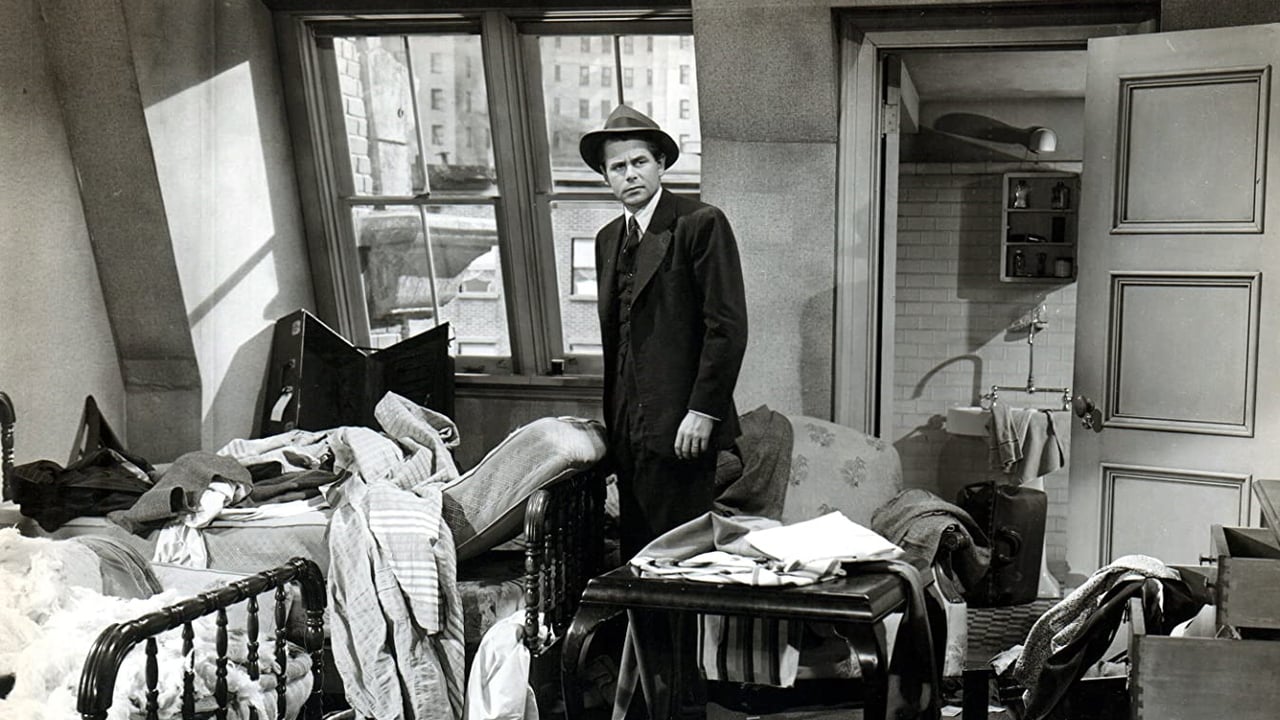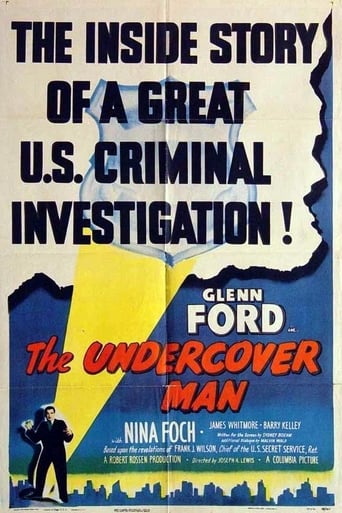



The greatest movie ever made..!
In other words,this film is a surreal ride.
if their story seems completely bonkers, almost like a feverish work of fiction, you ain't heard nothing yet.
View MoreThis is ultimately a movie about the very bad things that can happen when we don't address our unease, when we just try to brush it off, whether that's to fit in or to preserve our self-image.
View MoreThere is a certain lack of style here that represented two of the Director's seminal Film-Noirs, Gun Crazy (1949) and The Big Combo (1955). But there are some very Noir things that make this more interesting than a standard Studio Crime Drama. There is one scene that you would never find in the "regular stuff". An Italian Grandmother is given an extended, importantly motivational scene, and speaks in her Native Italian. It is translated by her Grandchild in English as the G-Men look on with admiration and respect.Such a long and laborious Scene, the Studios would say, is too Ethnic and taxing for the White-Bread target audience. But it turns the main Character around and is touching and unique. You gotta love Film-Noir. Another gripping, gritty scene is the murder of a potential Witness in front of the aforementioned 10 year old child and she looks on yelling Papa, Papa, Papa. Another powerful and offbeat scene.One could quibble and nitpick at some of the corny stuff such as the Leader of the Mob constantly referred to as "The Big Fellow", that's just silly, and the dated text opening, frequently used, that touts the exploits of the Feds as just a bunch of regular Joe's doing their duty for the good of us all.But this is a street level investigation that seems real and the Locations and the Characters are mostly Film-Noir and this one has enough strength to put it in good standing among, if not the best of, the Genre.
View MoreGlenn Ford, with his companions James Whitmore and David Wolfe, are employees of the US Treasury Department assigned to the case of "The Big Fellow" who runs "the syndicate", sometimes called "the mob," all of whose members appear to be living beyond their means. Really, Barry Kelley, their consigliere -- I mean their "lawyer" -- files income tax returns on five thousand a year, yet drives a five-thousand dollar Chrysler and lives in a home that Hugh Hefner would envy.Well, I'll tell you. It's a tough row to hoe. The extortion racket prevails in the city. Eyeball witnesses and their families are threatened. If the threats don't seem to be working, the witnesses die natural deaths full of bullet holes. There are some people involved in the racket, one way or another, who are sympathetic but they're terrified.By dint of much effort, long hours, intrigue, and one or two dangerous meetings, Ford and his pals crack the case and The Big Fellow and all his employees wind up in the slams.There's not a great deal of action. That's not a big problem. But the script is rather routine. There is -- how should I put this? -- there is nothing WRONG with Ford. There is no edge to his character. He doesn't smoke, drink, curse, or act rude. He never raises his voice. Ford loves his devoted wife, plans to leave all the schmutz behind him and retire to a farm. He's dedicated and smart but rather a bore. Compare him to Humphrey Bogart's Sam Spade in "The Maltese Falcon." Everything about the film seems pedestrian. Yet it's not a bad movie. It's diverting in a minor way. But it's possible to imagine a hundred ways in which it could have been improved. They could start by dumping the title that reeks of stereotypy since nobody ever goes undercover.
View More***SPOILERS*** Based on the true life conviction of Chcago Mob Boss Alfonso "Big Al" Capone the movie "The Undercover Man" really has nothing to do with undercover work by the FBI but in how the US Treasury Department was able to get a number of witnesses to testify against "Big Al", or the "Big Fellow" as he's called in the film, in a court of law without getting themselves killed by doing it. It's that which in fact landed the "Big Fellow" behind bars for an nine year stretch where his brain ended up being fried from the ravages of syphilis that he contracted while still free and on the loose. Getting the job done in getting the "Big Fellow" in a private cell at Alcatraz was Treasury Agent Frank Warrner, Glenn Ford, who not only risked his life but that of his wife Judith,Nina Fouch, an a number of his informants to do it. But it was the "Big Fellow's" sense of invincibility and arrogance that more then anything else did him in. That by his gang raising the body count and making people more willing to talk or testify against him feeling that they, in considering that their as good as dead already, had nothing to lose anyway. ***SPOILERS*** It was non other then the "Big Fellow's" mouthpiece or lawyer the smooth talking and slick Edward J. O'Rourke, Barry Kelley, who finally did his boss the "Big Fellow" in. That in him by trying to avoid jail time revealing that the jury pool members ,all 83 of them, for the "Big Fellow's upcoming trial have all been gotten to! That in making sure that he walks or else they'll end up on clutches and wheelchairs! "The Undercover Man" was probably the first movie to bring out how Alfonso "Big Al" Capone ended up convicted on both tax evasion charges as well as the violation of the Volsted,illegal bootlegging, Act that some the years later lead to the top TV crime series "The Untouchables". Still for some strange reason "Big Al" or Al Capone's name or even faces, he's alway shown from behind wearing a white fedora, was never once mentioned in the movie!
View MoreBefore bedecking the noir cycle with two of its gems - Gun Crazy and The Big Combo - Joseph H. Lewis exercised his talents on The Undercover Man. Scant surprise that it falls short of those two movies, the first of which boasted Peggy Cummins as Annie Laurie Starr and the second John Alton as director of photography. While the dependably gifted Burnett Guffey pinch-hits for Alton, the absence of any major female role makes a Cummins unnecessary (though still missed). So there's no countervailing axis to balance out the star, Glenn Ford.While Ford contributed yeoman's work in some indispensable titles, from Gilda to The Big Heat and Human Desire, he always stood at odds to the sardonic cool that was the hallmark of male leads in the cycle. In picture after picture, he unpacked the same old angst and wore it like a hair shirt. When his reasons were up there on the screen - a torch for Rita Hayworth, a blood-lust for revenge - he brought an uncommon intensity to roles that a flippant approach would have watered down.But in The Undercover Man he turns a glorified civil-service job into the stuff of agony. He's an undercover government agent; his worn-down wife, Nina Foch, joins him occasionally on his assignments but for the most part stays at home near Washington, D.C. where she's come to accept his extended absences with a long face. Ford and his partner James Whitmore find their frequently flipped Treasury credentials carry little weight in big-shouldered Chicago, where the syndicate's ruthlessness strikes witnesses blind and dumb even when victims are gunned down in broad daylight. And the mob's lavishly remunerated mouthpiece, Barry Kelley, impudently taunts Ford for his futile crusade against the never seen Big Fellow (as he's affectionately known around town). But in the dogged tradition of the Feds in movies like The House on 92nd Street and T-Men, Ford keeps slogging away until he finds a chink in the silent armor....The Undercover Man starts out in the detail-cluttered, reverential way of so many of these para-patriotic films, but about halfway through Lewis finds his stride and eschews hagiography for moviemaking. A tense and violent sequence among the street stalls of Chicago's Italian neighborhood, where a turncoat gangster is chased and killed in front of his little daughter, delivers a welcome jolt after all the handwriting experts and accountants' ledgers. But the movie always slinks back to Ford, suffering valiantly - he's such an irresistible target it's no wonder Kelley can't help needling him. And it's Kelley's sly, smug performance that lends The Undercover Man the subversive grit that, in the absence of Cummins (or any of her sisters), it sorely needs.
View More